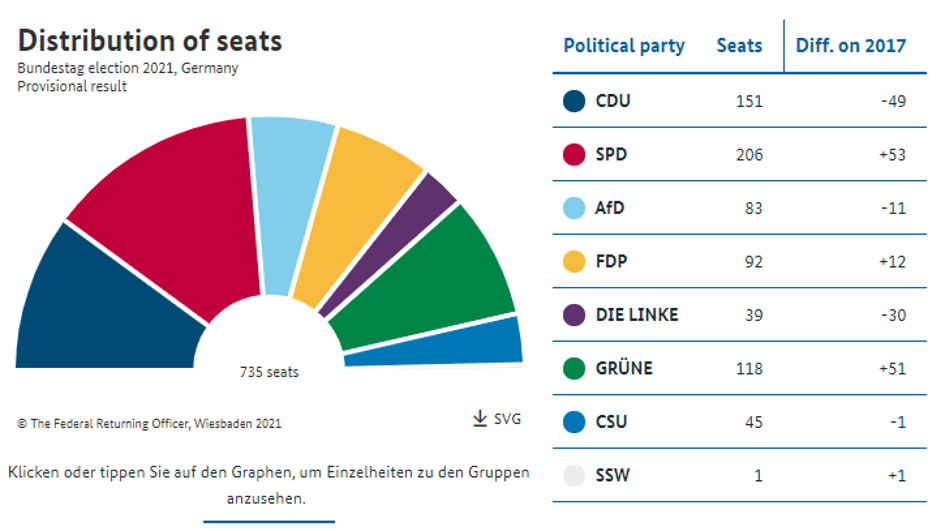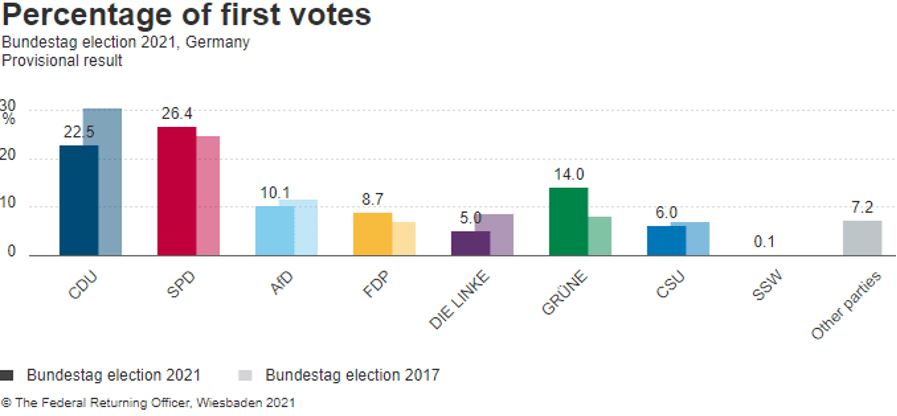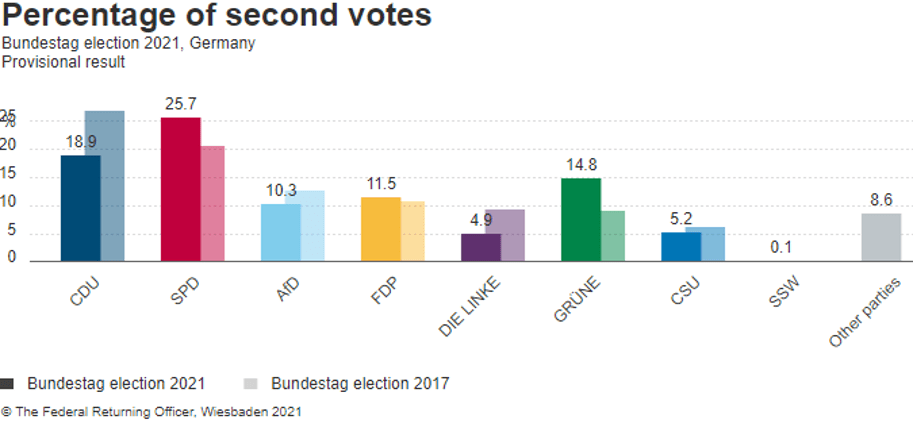The recently concluded German elections on September 26, 2021 have given a divided electoral mandate with outgoing Chancellor Angela Merkel’s conservative party the Christian Democrats (CDU) dominating the south and western part of Germany, while the center-left party the Social Democrats (SPD) have emerged stronger in rest of the country. Germany’s far-right party, the Alternative for Germany (AfD) has also led few areas of the former East Germany which are considered a stronghold for them.
Breaking down results of German elections
The CDU and the Christian Social Union in Bavaria (CSU) which have traditionally been political allies, termed as the Union, have won 196 seats, emerging as the second largest group.
However, there has been a major electoral setback with Angela Merkel losing her own constituency to SPD. This can be deciphered as a signal from the voters for a possible change and has made the race to the parliament interesting.
As per latest update from Germany’s official election commission website The Federal Returning Officer, the CDU and the CSU together have faced a loss of 50 seats in comparison to 2017. Alternatively, SPD has gained 53 seats, pointing to a clear shift of voters.

With 14.8 percent vote, the Grüne party has emerged as the third largest among the eight parties, bagging 118 out of the total 735 seats in the Bundestag, which is a jump of 51 seats from the 2017 tally.
The conservative bloc, led by the Christian Democrats (CDU), has logged its lowest-ever result since 1949 in federal election as reported by dw.com. There is not a single constituency in Germany where CDU/CSU made any electoral gains. Instead, to the surprise of the watchers, their losses in the 2021 election have ranged from 1.2 to 17.1 percent across the nation.
On the other hand, the SDU has gained in all the constituencies compared to their 2017 performance barring two districts in Aachen (hometown of CDU/CSU chancellor candidate Armin Laschet).
The SPD, the environmentalist Greens and the FDP are the only three major parties who have made electoral gains in the recently concluded elections.

When it comes to direct voting mandates in Germany, the first voter is allowed to vote directly for a candidate in country’s two-vote system. First vote results generally coincide with the second vote results for party lists.

What are the possible alliances for forming government in Germany?
With the total strength of the German Parliament Bundestag at 735 seats , attaining the majority mark at 368 seats will be an uphill task for all the possible fronts, with lots of possibilities and rumor doing rounds.
Olaf Scholz’s center-left SDP have emerged as frontrunners in the race and have already begun to show interest in forming a coalition with the Greens and the FDP (popularly known as the “Traffic Light” alliance due to respective party colors of red, green and yellow), which subsequently will take the combined tally to 416 seats. The “traffic light” alliance is most likely on cards as the SPD and the Greens have experience of working together in past under the leadership of Chancellor Gerhard Schroeder(1998-2005).
The CDU candidate Armin Laschet has also hinted at the likelihood of a potential coalition with the FDP and the Greens. This Union-led alliance is popularly labelled as “Jamaican” coalition, owing to the party colors of black, green and yellow, which reflect Jamaican flag.
The recent reports from Reuters have floated an idea Jamaican alliance resulting in 406 seats together.
There is yet another possible alternative to the alliances of “Traffic Light” and “Jamaica” but the speculation is rife that the SPD will certainly rule out a coalition with CDU as they have the experience of being a junior partner for 12 out of 16 years of Merkel’s governance.
Before election, there were also assumptions of SPD, Linke and Greens joining hands post-election results, but with joint numbers falling short of magical figure of 368 by five seats, this combination is certainly ruled out.
With SPD-CDU/CSU pocketing 402 seats out of total 735 seats, the chances of the formation of a third front government without the number one and two parties is an impossibility.
What to expect in coming days?
Assessing the current scenario, there is a clear fight from between the “Traffic Light” and “Jamaica” alliances. It is expected that present Chancellor Angela Merkel and her outgoing government will remain in office in a caretaker capacity until the Bundestag elects her successor.
The SDP wants to build a coalition with the environmentalist party Greens and the business-friendly party the Free Democrats to pace ahead in the race to parliament.
However, the path is difficult as the Free Democrats have often been seen out in open alignment with the Union ideology.
Amidst all these calculations, it is interesting to note that if Merkel’s caretaker government remains in office till December 17, 2021, Merkel will supersede the Helmut Kohl’s record of being the longest serving personnel in office among post-World War II leaders.
International communities are observing German political theatre with keen eyes. The US$4.42 trillion German economy Germany will have bearing on the rest of the world as the conservationist Greens and the FDP (Kingmakers) have different agendas and priorities.

